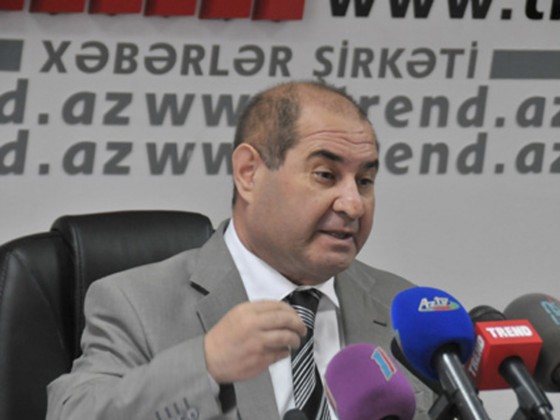
Director of the Center for Political Innovations and Technology, political analyst Mubariz Ahmadoglu
Specially for Trend
Chatham House can damage the policy conducted by Great Britain so far in the Nagorno-Karabakh settlement by inviting the head of the separatist regime of Nagorno-Karabakh Bako Sahakyan.
Basis:
Great Britain recognizes the territorial integrity of Azerbaijan and considers Nagorno-Karabakh as part of Azerbaijan. Great Britain sees the beginning of the Nagorno-Karabakh conflict settlement in the dialogue and cooperation of the Azerbaijani and Armenian communities of Karabakh. The British foreign ministry has repeatedly made such statements. The MPs, representing Great Britain in the EU and PACE, are guided by the same philosophy. British ambassador to Azerbaijan several times expressed his attitude to this issue. While addressing the Armenian socio-political circles even the British ambassador to Armenia several times asserted the interests of his country in Azerbaijan. This can be considered as a precedent.
British Minister for Europe David Lidington visited Azerbaijan to discuss the Nagorno-Karabakh settlement in November 2014. Here he met with the head of the Azerbaijani community of Nagorno-Karabakh Bayram Safarov.
II. There are no ethnonyms "Nagorno-Karabakh people" or "Armenians of Nagorno-Karabakh".
Basis:
Any Chatham House analyst may determine for 0.35 seconds that this ethnonym is fictional and is envisaged to mislead the international community. The difference between the language of the Armenians, living in Nagorno-Karabakh, and the Armenians, living in Armenia, is only 15 percent. However, the Eastern Armenian language spoken by Armenians, living in Armenia and the Western Armenian language, spoken by the Armenians of the Diaspora, differs by 80 percent. The Armenians, living in Armenia, consider themselves and the Armenians of the Diaspora as one nation, but the Armenians of Nagorno-Karabakh – another nation.
III. Armenians in Nagorno-Karabakh have never fought for independence. Fight for independence is a tactic that was later chosen forcedly to include age-old Azerbaijani lands in Armenia.
Basis:
During the USSR period, from time to time, Armenians were holding campaigns to separate Nagorno-Karabakh and other Azerbaijani lands from Azerbaijan SSR and include them in Armenian SSR. The Soviet of People’s Deputies of the Nagorno-Karabakh Autonomous Oblast adopted a decision on Feb.20, 1988 to withdraw the autonomous region from Azerbaijan SSR and include it in Armenian SSR.
Referring to the decision, the Supreme Soviet of Armenian SSR adopted a decision July 16, 1989 to include Nagorno-Karabakh Autonomous Oblast in Armenia. Following the collapse of the Soviet Union, Armenia repeatedly returned to this issue and its attitude to this has always been affirmative. Armenians of Nagorno-Karabakh realized that it is impossible to directly join Armenia, therefore, as an interim option they abused the idea of independence and allegedly held a "referendum".
IV. “Referendum on independence” of Armenians of Nagorno-Karabakh can’t be considered legitimate.
Basis:
This “referendum” has no legal basis. Because, when it was decided to hold a “referendum”, both Azerbaijan SSR and Armenian SSR had adopted a decision on secession from the USSR, as well as on the declaration of independence.
Therefore, reference to the USSR legislation has no grounds. All the more so, 15 Soviet republics had the right to secede from the USSR. This didn’t apply to autonomous structures or autonomous regions within the Soviet republics. On the other hand, there was not an appropriate legislative framework in Azerbaijan and Armenia that declared their independence.
The most important issue that should be taken into account is the deportation of Azerbaijanis. Armenians held a “referendum” only after the deportation of Azerbaijanis from Nagorno-Karabakh.
V. A small number of Armenians of Nagorno-Karabakh has never made any decisions and is not able to do so.
Basis:
The occupied Nagorno-Karabakh is a de facto part of Armenia. As well as Gyumri, Karabakh is characterized by its pro-Russian stance. Now Armenia itself cannot form and pursue an independent policy. In this case, the belief of analysts of Chatham House in Karabakh’s ability to make independent decisions is suggestive.
VI. The head of the Azerbaijani community of Nagorno-Karabakh or his representative should be invited to the meeting at the same time and in the same status as that of Bako Sahakyan. This is more in line with the policy of the United Kingdom in the Nagorno-Karabakh conflict settlement.
VII. Chatham House said in a statement released in connection with a meeting with Sahakyan that it respects the sovereignty and independence of Azerbaijan, however, it forgets about territorial integrity. Therefore, in anticipation of a meeting with Sahakyan, Chatham House should express its attitude towards the territorial integrity of Azerbaijan.
VIII. If the United Kingdom has started to pursuea policy of strengthening the resistance against the regime of Sargsyan in Russia against the background of recent developments in Armenia, it is the wrong direction of policy. Russia can bring the situation in Armenia to any level and turn it into regional chaos. In this case, the United Kingdom will suffer the greatest damage. That’s because United Kingdom is a western country which has the highest economic participation in the region. It would be more effective if the United Kingdom, based on the relations with Azerbaijan and Georgia, would continue the policy of strengthening its position in the region. It is necessary to force Armenia to relations with Azerbaijan by all possible means. The path to this lies not through support of separatism in Nagorno-Karabakh, not through acclaiming the results of occupation, but through the return of Nagorno-Karabakh to Azerbaijan.
Edited by CN
Trend
